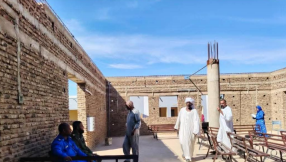
Across the country, churches are welcoming refugees, asylum seekers and other migrants into their local communities.
Many of these new arrivals need help with their English and Christian TEFL is supporting churches as they seek to meet that need by training up their members to become English language teachers.
A new short course about to launch in July will help churches and other groups and individuals in this vital work.
William Bradridge, Director of Studies at Christian TEFL, speaks to Christian Today about how offering free English language classes is helping churches welcome in the stranger - and share their faith.
CT: What inspired you to set up Christian TEFL?
William: My wife and I were English language teachers and together we set up a company called Global English to train people online in teaching English. We are Christians and we wanted to do something that would be effective for the Gospel so we prayed about how this might work and whether we should use our English language teaching to go on missions somewhere. But we had a young family so we didn't feel that was the right move for us.
The answer seemed to us to be that we should use our business in a way that was creative and would enable people to be sent out to countries that they can't go to so easily as a Christian but can go to as an English language teacher.
In 2012, God opened a door and we set up Christian TEFL. We now partner with six different mission agencies and train Christians for work in the mission field all across the world through teaching English. What makes us different is that we are Christians training Christians and proceeds go towards Gospel mission, whether overseas or increasingly here in the UK through church outreach using ESOL - English to Speakers of Other Languages.
CT: What change have you seen in the UK in this respect and how is your ministry responding to that?
William: The diaspora, in effect, means that so many second language speakers have come to the UK. Many of them will walk down our streets and pass church buildings without ever considering going inside or understanding its place in the community. Many of them will only see post-Christian Britain in terms of its secular culture and wonder what Christianity is.
Research has also shown that there is only about a six month period after a refugee or asylum seeker comes to the UK where they are open to learning the language and adapting to the culture. If they don't do it within those six months, it becomes much more difficult because quite often they will be drawn into a community and it's particularly hard then to step out and learn English or adapt.
So we are encouraging churches to step out in faith and meet a need much in the same way they do with food banks, debt counselling and initiatives like Street Pastors. Churches are well placed to respond to needs right where they are in their communities and we are asking them to do the same through English language teaching.
And we also want to build our communities and make them stronger. I love the fact that the UK is a multicultural nation of different tribes and tongues where in some places, you can walk down the street and hear six or seven different languages being spoken. But at the same time we want to offer something else which is not just English but the hope we have in Jesus Christ.
CT: How are churches using the training?
William: There are roughly three ways that churches right now are using the training. The first is a low-key way of engaging. So for example at my church in Exeter, we run an international cafe that is secular in the sense that we welcome anybody from any background and we offer pretty standard English conversational classes. But because these take place at 5pm on a Sunday evening, we invite them to stay on for the service at 6:30pm and let them know that they are welcome to join us in church.

The second way is to offer English language classes that offer themed lessons on faith at important times of the year like Easter and Christmas. They might be familiar with Santa and the Christmas tree but not know very much about where Christmas comes from or why it is important. That then opens the door to a shared conversation about faith and we can ask them things like, 'What about the faith in the country where you come from?' 'What do you think about these ideas?' Have you heard of Jesus and what do you think about him?'
In some ways, we have to build the relationship before we can share the Good News because it's important to understand where they are on their own faith journey and what they believe before we ask them what they think of our faith.
The third way is to be really intentional about it and, more recently, we've been working in this way with the Co-Mission network in London. A lot of great conversations take place over food so they first have a meal together followed by an English class using the Bible.
CT: How is the Bible incorporated into English language teaching in these instances?
William: Mark Vernon, Co-Missions Cross-cultural Co-ordinator, hosted a webinar recently on how he uses the Bible in English classes. He will take a short text and explain the meaning and the context, and look at the new language in it. The group then discusses it at their tables using questions to explore the text further.
One recent series was on the Lord's Prayer and explored a different line each week looking, for example, at pronouns and what 'Our Father' means, that He is the Father of all and how Father indicates a relationship with our God in Christianity. That concept is completely different to most other religions who see God as being distant.
CT: Do you find that most of the churches signing up to do this are in an urban context or are rural churches doing it too?
William: That's a great question because I thought it would be urban centres but we ran a pilot project in 2019 just before Covid and we chose three different places. One was here in Exeter which is a university city but not particularly multicultural. The other was in Bradford which is very multicultural with a lot of ethnic diversity. The third church was in Colwyn Bay, a small seaside town in north Wales.
Interestingly, in the case of Colwyn Bay, the council in Manchester had started distributing Syrian refugees out of the city and some of them were placed in north Wales. The Red Cross was running ESOL classes for them but got in touch with the local church because they felt they needed more and so they asked if the church could help. That church then reached out to us and we trained five members who started English classes for the first Syrian refugees in the town.
CT: What kind of things do refugees need to learn?
William: The ESOL classes are particularly helpful with reading and writing skills but what refugees often want is the opportunity to practise speaking English in a safe, friendly and supportive environment, and churches can offer that.
But it's really practical stuff. One person asked for help because they didn't know how to fill in a form so we teach them how to do that and where to put their first name and their second name.
What we try and do for absolute beginners is teach very easy English that is functional and practical, things like doctors' appointments or going
to a cafe and ordering a cup of tea or coffee and knowing what the barista might say in return, because it's all very well learning how to say something but you need to understand what the person is saying back to you and be able to respond appropriately.
CT: How else can it benefit refugees and other second language speakers in the communities?
William: There are so many ways and one way that is particularly relevant for Hong Kongers that we are seeing coming over in increasing numbers is passing the Life in the UK test, which tests their language skills and knowledge of English culture. The situation of Hong Kongers is slightly different because they have been given five-year visas with full rights to live and work but if they want to apply for the right to remain in the UK, they will still need to pass that test at the end of the five years.

The international cafe we run here at St Leonards, Exeter, has around 40 to 50 Hong Kongers coming every week to meet and practise their English. But it's also part of a wider support 'package' being run by the church. So, one week a doctor came in to talk about the health service. Another week a police officer came in to speak about how policing works here in the UK. This is important because there are differences in how policing works around the world, so policing here might look very different from policing in Hong Kong, for example. And this past Sunday we had someone in from Wellbeing Exeter to talk about how we can look after our mental health.
CT: So it seems like there's so much more to it than learning English?
William: Yes. Anyone who has ever relocated to a new country will know how challenging that can be. In the beginning there can be this euphoria because everything is new and exciting but that will eventually dissipate and people get homesick and experience all the challenges of adapting and finding a job.
We want to be able to support refugees and others in all of these things and we can do that through these English classes. The overall goal is to help them overcome the loneliness and isolation that they may feel in those crucial first few days, weeks and months in the UK. In that sense, it's about so much more than teaching English. There is the befriending and the opportunity to walk alongside people, share life together, and
offer that helping hand. However, we also want to look for opportunities to be intentional for the Gospel as well.
CT: You are launching a new short course for churches and families supporting refugees. What can people expect from this course?
William: We've just received a grant from Western Power Distribution - the electricity provider for the Midlands, South Wales and the South West - to train families hosting Ukrainian refugees or churches and community groups helping asylum seekers and refugees from other countries.
Around 75,000 refugees have arrived from Ukraine so far and are staying with families here, many of whom will have no English language training. They've simply got a spare room and want to help and welcome the stranger (Hebrews 13:2). So how can we communicate with this person who potentially has no English? How can we talk to them? How can we give them a good welcome? How can we signpost them to other agencies that provide support?
This short course is for people interacting with refugees who wish to engage positively, helping them overcome isolation, providing an opportunity to meet together online and build community. We are working towards a 1 July launch and it will be available for free for the first 100 groups or individuals who sign up from the Western Power Distribution area, and nationwide at a nominal cost.
Register here for a webinar about the new short course from Christian TEFL on supporting refugees with English language lessons. Click here to find out more about the training available from Christian TEFL.













